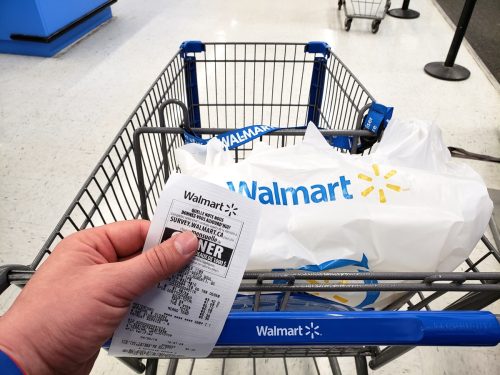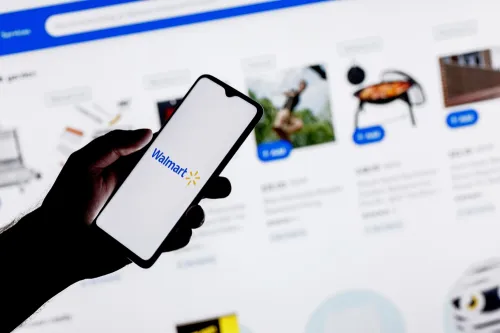Walmart Is Being Accused of “Deceiving Its Consumers” by Doing This

Walmart has gotten many things “right” recently—they’ve given shoppers more buying opportunities via Walmart Restored and expanded their search engine capabilities for those who speak Spanish. But with the good, there’s also the bad, as one consumer claims that the retailer is knowingly pulling one over on you. Deceit is a pretty serious accusation, but that’s exactly what a new lawsuit alleges Walmart, as well as Target, are guilty of. Read on to find out what the lawsuit says and why you might want to double-check your latest shopping receipt.
READ THIS NEXT: Walmart and Dollar General Are Under Fire for Doing This to Shoppers.
Walmart faced backlash just last week.

Thanks to its size and reach, Walmart is not immune to criticism by any means. The retailer was sued by the Federal Trade Commission (FTC) on June 28 over alleged money transfer fraud, as the agency claimed that Walmart had “fleeced consumers out of hundreds of millions of dollars.”
Walmart refuted the claims, but the retailer found itself in hot water again on Aug. 3 when it was slapped with major fines by the North Carolina Department of Agriculture and Consumer Services. According to a press release from the department, 19 Walmart stores were found to be overcharging customers as a result of price-scanner errors during the second quarter of 2022, as were 27 Dollar Generals, six Family Dollars, and two Targets, among others. Walmart owed a grand total of $95,665 in penalties, but this was not the first time price-scanner errors were detected at North Carolina Walmarts. In April, four Walmarts in the state were hit with penalties totaling $22,165.
Pricing is becoming even more of an issue, as the retailer was just hit with another lawsuit.
Separate lawsuits were filed against Walmart and Target.

Apparently, inconsistency is not only affecting customers in North Carolina but in Illinois as well. Yoram Kahn has filed two separate class action lawsuits against Walmart, Inc. and Target Corporation. According to Top Class Actions, Kahn claims both retailers have “shelf pricing” that “frequently misrepresents the prices consumers are charged at the point of sale.”
Put simply, Kahn indicates that the price you see on the shelf doesn’t match what rings up at the register. This violates the Illinois Consumer Fraud and Deceptive Practices Act and the Illinois Uniform Deceptive Trade Practices Act, Kahn claims, alleging that both Walmart and Target are “guilty of unjust enrichment,” as Top Class Actions reports.
RELATED: For more up-to-date information, sign up for our daily newsletter.
Kahn called this a “bait and switch.”

Kahn alleges that this pricing discrepancy directly impacts shoppers who “fall victim to a classic ‘bait and switch,'” the lawsuit states, per Top Class Actions. Customers may then pay more without even realizing it. The lawsuit alleges that the price misrepresentations cost Walmart shoppers 5 to 10 percent more, but for Target customers, the range is even larger—between 5 and 20 percent.
“Consumers reasonably rely on Shelf Pricing to make informed purchasing decisions, and reasonably expect to pay the advertised Shelf Price when they reach the checkout,” both lawsuits state.
By not matching prices between the shelf and the register, Kahn states that each retailer is “deceiving its customers,” a concern echoed by several consumers, per the comment section on the Top Class Action article.
“I’ve been saying this for years! Also, these stores place OTHER products by the sale price so customers assume that’s the actual price for said products,” one commenter wrote, adding that they’ve actually moved products away from the inaccurate shelf price. Another commenter added that it’s “very unnerving when you can’t trust these companies to not play games like this.”
A Walmart spokesperson said in a statement to Best Life: “We encourage customers to bring pricing inaccuracies to our associates’ attention, and we will happily address the matter. We are reviewing the Complaint and will respond in Court as appropriate after we are served.” Target did not respond to a request for comment.
Other Walmart shoppers voiced complaints about overcharging.

Allegations have also been circulating on the social media platform TikTok.
“Walmart is scamming people, so listen up,” a TikTok user named Brenna, who uses the handle @brennasbakery, said in a video on July 29. She stated that she went to purchase Wilton chocolate candy melts at Walmart, but when she got to the register, the chocolate was ringing up for more than the price listed. According to Brenna, the online price, as well as the price in the store aisle, was $2.62, but the chocolate rang up for $4. After asking the cashier for a price match, she then noticed five additional items in her cart rang up higher.
“I understand inflation is making a lot of prices go up,” she said in her video. “But if the price is also indicating something online, and you can buy it for that price online, and it’s that price in the aisle, they’re scamming you. They’re purposefully marking up prices because most people are not gonna check that when they’re checking out.”
However, if you find an item online that has a lower price than what’s listed in the store, it is Walmart’s policy to price match, as was confirmed to Best Life by a company spokesperson previously. The company also said in response to this specific lawsuit that they are “testing an enhanced electronic shelf labeling initiative and improved handheld app capabilities to help associates with price confirmation and adjustment when needed.”